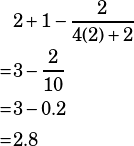I’m not sure you are answering questions about Practice Test 6 yet. If so, would you please work # 12 in section 3 of that test?
Sure I am—I just haven’t been tracking those answers yet. I’ll get that set up soon.
This one is a straight up plug in question. Say x = 2:

Which answer choice simplifies to 2.8?
Obviously not A, B, or C (C is 2 minus something positive, so it can’t be 2.8).
Confirm D:

You could also do the long division…but why? 🙂

That tells you that the quotient is x + 1 with a remainder of 2, just like choice D says.
